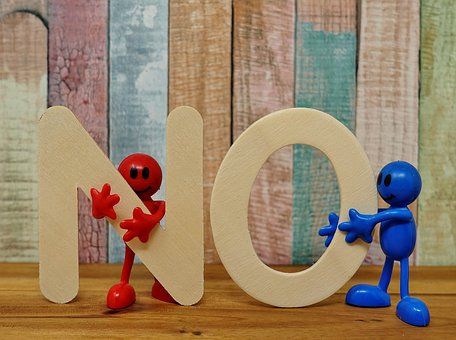Rejection:A Phase Of Life
May 23, 2019 • 135 views
Rejection mimics physical pain, it is something which hurts as much as physical pain does. Studies show that the same areas of brain are activated when someone experiences physical pain or when someone faces rejection, that is why rejection hurts so much. Every time a person thinks about the rejection faced, he will feel the same pain but this is not the case with physical pain, the same kind of pain cannot be experienced while thinking about the physical pain. Motivating forces for people is the fear of rejection and the desire for acceptance as it plays a major role as people for the desire for acceptance choose their career directions, their education, work behaviour, interpersonal relationships, and the ways in which to spend their leisure time.

SOCIAL REJECTION
Social rejection occurs when an individual is deliberately excluded from a social relationship or social interaction. Social rejection includes peer rejection, parental rejection and romantic rejection. A person can be rejected by individuals or an entire group of people. Rejection can be eitherbybullying, teasing, or ridiculing, or by ignoring a person, or giving the silent treatment. Some level of rejection is part of life but it can become a problem when it is prolonged or consistent, when the relationship is important to a person, or when the individual is rejection sensitive. Rejection by an entiregroupof people can have especially negative effects, particularly when it results in social isolation.
Rejection can lead to adverse psychological consequences such as lonliness, lowself esteem, agression and depression.It can also lead to feelings of insecurity and a high sensitivity to future rejection. Rejection may be emotionally painful. because of the need of social interaction between humans is essential.Abraham Maslowhave suggested that the need for love and belongingnessis a fundamental human motivationand according to him, all humans needs affection and also should be able to do so to be psychologically healthy.
Peer rejection
People who have experienced peer rejection tend to have lower self-esteem which results in Depression. Some people show their pain by being aggressive while some hide their pain and suffer by themselves. Rejected children are most likely to have violent behaviour, feel depressed and lonely as compared to popular ones, they are more likely to be anxious and fearful.
Children who do not externalize their behaviour by not being aggressive are more prone to anxiety and mood disorders. Children who show externalising behaviour exhibit aggressive and violent behaviour. Rejected children may resort to dangerous behaviour to earn acceptance of their peers.
Parental rejection
Rejection by parents have devastating effects on children, it is simply against the nature, the effects of parental rejection are long lasting as well as detrimental. Parental rejection has negative impacts on people’s lives and it has the worst kind of effects on someone’s personality.
TYPES OF REJECTION
Everybody has experienced some kind of rejection, which is a part of life. Nobody can avoid it. Rejection can be through following ways:
The Unspoken Rejection
Sometimes people give their everything to try to make up to personal or professional life but hearing nothing from the other side can hurt a person badly. Being ignored can sting just as much as being told you’re not qualified for the task at hand. “It makes you feel bad about yourself, and it makes you feel like nobody wants to be around you. It makes you feel angry,” says Geraldine Downey, Ph.D., a professor at Columbia University who studies rejection as it relates to human psychology. Research shows people with low self-esteem actually feel rejection more deeply than those who have high self-esteem.
The straight ‘No’ Rejection
Being rejected directly stings but not as much as being ignored, it provides people with some closure. Receiving an application with the rejection can be harsh and impersonal but people should not get discouraged with this instead they should assess the situation logically. As Diane Gottsman, etiquette expert and onwer of the Protocol School of Texas, says, don’t interpret a rejection as a judgment or spiteful critique of your own self-worth. Instead, use it to criticize what your weaknesses may have been in your original query.
The Nicely-Worded ‘No’ Rejection
Being excluded from a social group you wanted to be a part of can crush you in the most intimate of ways, it hurts. In fact, a study done by the University of Michigan Medical School proved that the brain tries to comfort social rejection in the same way it deals with physical injury, the team also found that persistence helps ease the pain.
The ‘No’ With Suggestions For Improvement Rejection
In some rejection letters, the company or employer encourage you to fix certain elements of your application and apply again, whether it be to the same organization or to the field in general. People receiving these kinds of rejections should consider themselves lucky as only few people get such suggestions with rejection letters.

JOB REJECTION
The key to success is to avoid getting depressed by staying positive. Tips to deal with job rejections:
Always keep a second plan ready so by one rejection you do not feel depressed and have something else in mind which can be perceived.
People should not only rely on the interviews as employers are hiring people to fulfil the needs of their organisation and not for the benefits of candidates.
Rejected candidates should ask for feedback and should ask for reasons for their rejection and should try to fulfil the requisites.
People should focus on their strengths and try to identify the opportunities and should find faults due to which they are getting rejected.
Should not feel alone as you are not alone who is being rejected but there are many more. So, you should focus on next opportunities.
Always keep a positive attitude as the best way to deal with rejections is to keep a smile. This will help to turn every rejection into an opportunity.
A rejection is nothing more than a necessary step in the pursuit of success.
- Bo Bennett
